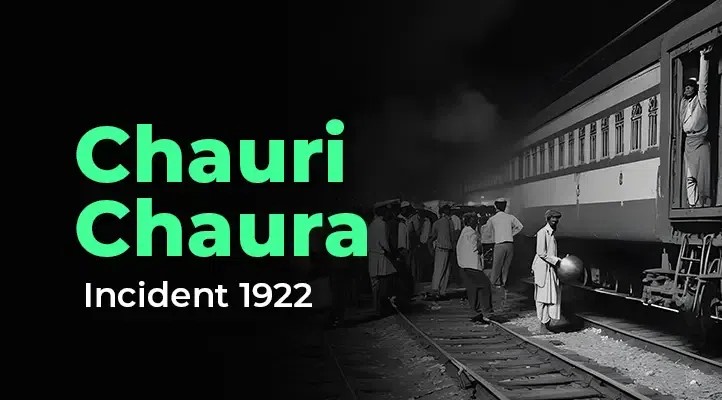The Chauri Chaura Incident: A Turning Point in the Non-Cooperation Movement
History Indian HistoryPosted by NewAdmin on 2025-02-05 08:47:28 |
Share: Facebook | Twitter | Whatsapp | Linkedin Visits: 25

The Chauri Chaura incident, which took place on February 4, 1922, in the town of Chauri Chaura in Uttar Pradesh, was a pivotal moment in India's struggle for independence. It was an event that greatly impacted the Non-Cooperation Movement, led by Mahatma Gandhi, and shaped its trajectory. At the time, the movement was at its peak, with widespread participation across the country. People were boycotting British goods, resigning from government jobs, and protesting against British rule using nonviolent methods. However, the Chauri Chaura incident highlighted the complexities of mass participation in nonviolent resistance.
On that day, a group of villagers protesting the British authorities clashed with the police. The situation escalated when the protesters, who were part of a larger procession, became agitated after a scuffle with the police. In retaliation, the crowd set fire to a police station, killing 22 policemen inside. The violence shocked Gandhi, who had always emphasized the importance of nonviolence as the cornerstone of the independence movement. He believed that the moment violence was used, the movement would lose its moral authority, and it would no longer align with the principles of satyagraha (truth-force).
In response to the Chauri Chaura incident, Gandhi made the difficult decision to call off the Non-Cooperation Movement. This move was met with disappointment by many who had expected the movement to intensify, but Gandhi’s decision was based on his deep commitment to nonviolence. He felt that the masses were not yet prepared to maintain the discipline of nonviolent protest, and that if the movement continued in its current form, it could lead to further violence.
Though the Chauri Chaura incident marked a temporary halt to the Non-Cooperation Movement, it was significant in showing the challenges of mobilizing large groups while maintaining strict adherence to nonviolence. It also reaffirmed Gandhi’s commitment to his principles and helped shape the future direction of India’s freedom struggle. Despite the setback, the incident did not dampen the overall spirit of the independence movement. It highlighted the need for greater political consciousness among the masses and contributed to the growing resolve to break free from British colonial rule.
Search
Categories
Recent News
- Indian Girls Fight Back: Empowering Self-Defence
- Nellore MP Pushes for Swift Development with Central Funds
- Hyderabad Police Close Muslim Martial Arts Camp
- Olympic Bidding Wars: A New Era of Transparency?
- Security Forces Eliminate Terrorists in Jammu and Kashmir
- Iranian Women Break Free: Motorcycles and More
- Neves' Long-Term Commitment: Al-Hilal Secures Their Star
- Unveiling the Secrets of Seduction: China's Controversial Flirtation School
Popular News
- Navigating IPO Market Dynamics Amid Volatility and Regulatory Changes
- Massive Worldwide Microsoft Outage Disrupts Multiple Sectors
- Panjapur Bus Stand to Reshape TNSTC Routes
- తెలుగుదేశం పార్టీ - పేదరికాన్ని నిర్మూలించడంలో వాగ్దానం
- Universities Embrace Remote Learning Technologies Amidst Ongoing Pandemic